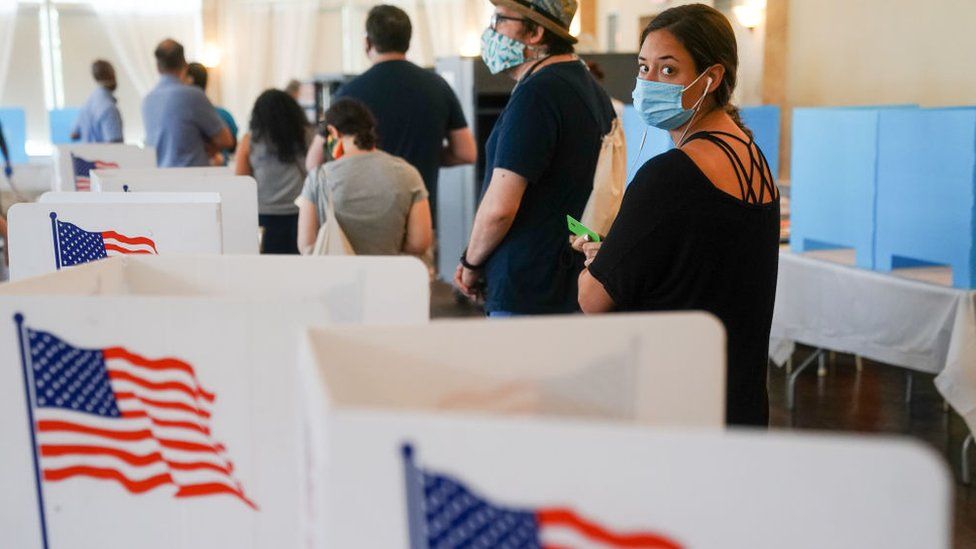Georgia voting: Fact-checking claims about the new election law
- Published

A controversial new election law in the US state of Georgia has led to heated disagreement between Democrats and Republicans over its impact on voting.
Georgia voted for Joe Biden in the 2020 election, the first time the state had chosen a Democratic presidential candidate in more than 25 years.
Democrats say the new law, external aims to restrict voting in future elections, but Republicans who control the state's government say it expands access and increases election security.
We've looked at some of the main claims.
Will voting hours be restricted?
President Biden has said: "What I'm worried about is how un-American this whole initiative is. It's sick. Deciding that you're going to end voting at five o'clock when working people are just getting off work."
But it's not the case that voting has to finish at 5pm.
The law allows counties to set voting hours anywhere between 7am and 7pm, as was the case previously.
The new law does lay out the hours that are required as a minimum on election day, saying "voting shall be conducted beginning at 9:00 A.M. and ending at 5:00 P.M.", as opposed to "during normal business hours" stated in the old law.
But "normal business hours" were widely interpreted as 9am to 5pm anyway, so the practical impact of this change is negligible.
Will there be fewer drop boxes?
Drop boxes allow voters to submit their ballots early into locked containers, rather than relying on sending them in via post or standing in long lines on election day.
Democrats say the new law reduces the number of these boxes, making it harder to vote.
There will be fewer in forthcoming elections, but this needs to be put in context.
Prior to the 2020 election, drop boxes weren't used in Georgia. They were brought in as part of emergency Covid action.
The new law does significantly reduce the number of drop boxes from the 2020 level.
For example, Fulton County says it will go down from 38 to eight drop boxes.
The new law also means the boxes will be held in buildings and can only be accessed in the hours that early voting is allowed, rather than 24 hours a day as was the case in 2020.
But Georgia Governor Brian Kemp says: "People act like we're taking something away - it never existed until the pandemic, it was done by emergency rule, not by legislative action."
Although the new law reduces the amount of drop boxes across Georgia compared with the last election cycle, it does make them a permanent feature in future elections in the state.
Can early votes be cast on a Sunday?
One of the most controversial elements of the bill initially proposed by Republicans was the elimination of Sunday early voting.
Sunday voting is especially important for black worshippers in Georgia - a strongly Democratic voting bloc - with church goers often encouraged to vote after Sunday services, with initiatives known as "souls to the polls".
Democrat Senate Majority Leader, Chuck Schumer, said: "Republicans recently passed a bill to eliminate early voting on Sunday."
But this element of the bill wasn't passed, and Republicans backtracked following criticism.
The final bill allows two days of early Sunday voting, which is now formally signed into law. An additional day of mandatory Saturday early voting has also been added.
Are people banned from giving water to voters?
There's been criticism of a provision which bans some people from handing out food or water to voters within a certain distance of polling sites.
It's true that the rules on this have been tightened.
Republicans say the move limits potential interference before people cast their ballots.
In previous elections, voting rights groups have often given out supplies to people standing in long lines at voting locations, which are a feature in US elections.
Long waits are more common in areas with a larger black population, external, often due to fewer polling stations and other barriers to voting.
But Republicans have pushed back on claims that the new law criminalises giving water to voters.
Although poll workers are still allowed to give away water, other people will have to follow certain restrictions under the new regulations.
The law makes it an offence to give away food or water within 150 feet of a polling place or within 25 feet of any voter in line.
Violations can be punishable by up to a year in jail and a $1,000 fine.
What else is in the new law?
There are dozens of other provisions, but the tightening of some restrictions around postal ballots has attracted attention.
The new law says postal ballots can be sent out to voters who request them 29 days before election day, as opposed to 49 days previously.
And new voter ID requirements mean signature matching will no longer be used to confirm identities on postal ballots - a method railed against by Donald Trump., external
Instead voters will have to provide one form of identification, such as a driver's licence or social security number.
Proponents of the bill say this method will make postal voting more secure, but critics argue the new measures are likely to disproportionately affect black Americans, who are less likely, external than white Americans to have voter identification.